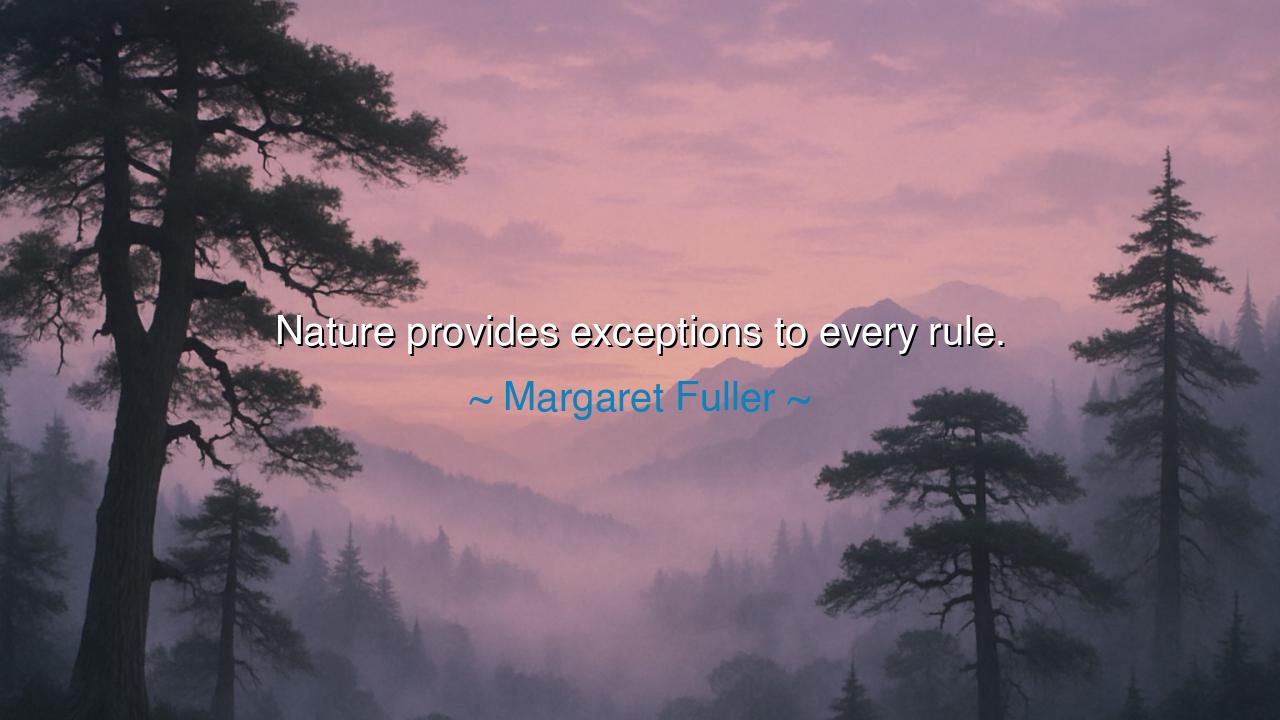
Nature provides exceptions to every rule.






Margaret Fuller, the brilliant transcendentalist and champion of women’s voices, once wrote with piercing simplicity: “Nature provides exceptions to every rule.” These words, though brief, carry the weight of centuries of wisdom. They remind us that the world we inhabit is not a rigid machine, bound in iron laws without mercy, but a living, breathing mystery that always leaves room for the unexpected. Where human reason draws strict lines, nature bends them; where mankind proclaims absolutes, nature reveals exceptions.
The origin of this thought comes from Fuller’s immersion in both philosophy and observation. Living among the transcendentalists, she embraced the belief that nature was not merely a backdrop to human life, but a teacher, a mirror, and a guide to higher truth. In every law of science, in every principle of reason, she saw not finality but flexibility. The sun rises each morning, yet sometimes it is hidden by storm. Birds fly, yet there are birds who swim. Rules help us grasp order, but exceptions remind us that order is more wondrous than we can confine.
History abounds with testimony to this wisdom. Consider the story of Helen Keller. By every rule of her age, a child both deaf and blind was destined for silence and ignorance. Yet nature provided an exception: through the devotion of Anne Sullivan and the indomitable spirit of Helen herself, the world saw knowledge and eloquence burst forth from the seeming void. The “rules” of limitation were shattered, and an exception became a beacon of human possibility. Fuller’s words find their living proof in such stories: the unexpected is not an accident, but the design of a generous universe.
Even in the sciences, the greatest breakthroughs often come from exceptions. For centuries, Newton’s laws seemed unshakable, explaining the motion of planets and the fall of apples. Yet when light bent around the sun in ways unpredicted, Einstein revealed a new law — relativity — born from the exception. Thus, nature shows humility to no man’s certainty. Every rule is provisional, awaiting the whisper of some anomaly that will open the way to deeper truth.
But beyond science and history, Fuller’s insight is deeply spiritual. To believe that nature provides exceptions is to believe in hope. No fate is absolute, no law of sorrow unbreakable. Where one life seems doomed to failure, another surprises us with resilience. Where oppression seems unending, a voice rises, unexpected, to call for justice. Exceptions are the cracks where light enters, the signs that remind us that the universe is not closed, but open — alive with possibility.
The lesson, then, is both humbling and empowering. Do not hold too tightly to the rules you believe to be universal. Leave space in your heart for the exception, for it may arrive when least expected. When you face despair, remember that nature’s laws of renewal may yet bring you spring after winter. When you encounter someone dismissed by society, remember that the exception may dwell in them, waiting to unfold. And when you are told, “It cannot be done,” recall Fuller’s wisdom: the greatest truths often come through the breaking of rules.
What must we do? First, train ourselves to see not only patterns but also deviations, not only laws but also surprises. Second, embrace the exceptions in ourselves — those qualities that do not fit the world’s categories — for they may be our greatest gifts. Third, approach others with openness, knowing that behind every rule of judgment there may be an exception that overturns it. To live with this awareness is to live with reverence for the mystery of creation.
Thus let Margaret Fuller’s words echo across time: “Nature provides exceptions to every rule.” Take them as a shield against despair, a balm against rigidity, and a torch for your imagination. For in the end, it is the exceptions — the unexplainable resilience, the unpredicted grace, the unforeseen breakthrough — that reveal to us the true magnificence of life.






AAdministratorAdministrator
Welcome, honored guests. Please leave a comment, we will respond soon